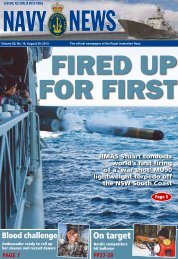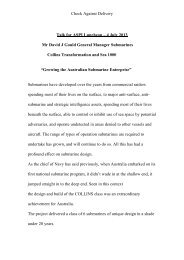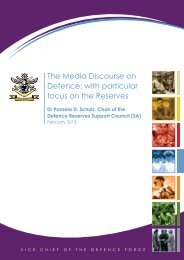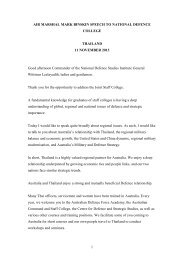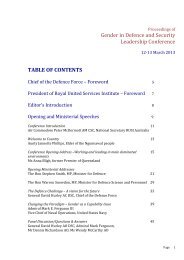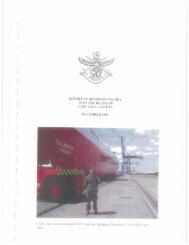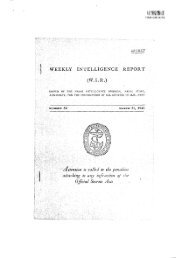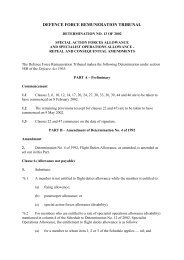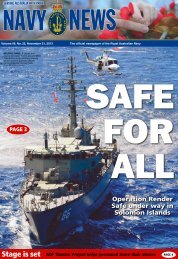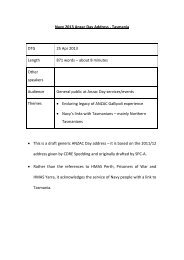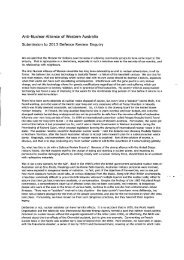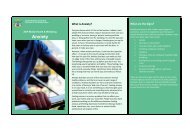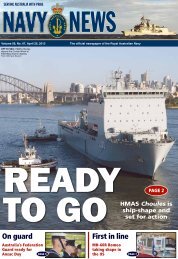049 QuakersVic
049 QuakersVic
049 QuakersVic
You also want an ePaper? Increase the reach of your titles
YUMPU automatically turns print PDFs into web optimized ePapers that Google loves.
The Religious Society of Friends (Quakers)<br />
Victoria Regional Meeting Inc.<br />
Reg. No. A0016299T<br />
1 Friends' House, 63f0rronn Road, Toorak, Vic 3142<br />
I<br />
PEACE AND SOCIAL JUSTICE NETWORK<br />
Australian Defence White Paper 201 3<br />
Australian policymakers face a dilemma. This arises because Australia's economic and<br />
military policies are based on a contradiction. On one hand China is Australia's largest<br />
trading partner. The Chinese economy is predicted to become the world's largest economy<br />
within the next few decades. Japan is Australia's second largest trading partner, although its<br />
economic power is declining. On the other hand Australia has aligned itself militarily with<br />
the United States through the ANZUS Treaty and with Japan through defence agreements.<br />
US power is now in decline.<br />
In 201 1, after a decade of conflict, the United States adopted a strategy called the Asia<br />
pivot strategy. In more recent times this policy has been termed 're-balancing'. The policy<br />
is aimed at the rise of China and has both economic and military aspects. Its object is to<br />
attempt to reassert US global power economically and militarily.<br />
This paper will concentrate on the military part of this policy. In pursuit of the Asia pivot<br />
policy, the United States has convinced Australia to become increasingly more tied to US<br />
military operations through a range of measures:<br />
accepting the stationing of US Marines in Darwin on a rotating basis,<br />
- - -.<br />
more frequent visits of US military aircraft,<br />
new facilities at Pine Gap, the Naval Communications Station Harold E. Holt at<br />
North West Cape and the Communications Station at Kojarena near Geraldton<br />
and possible new roles at HMAS Stirling in Perth and the Cocos-Keeling islands.<br />
The underlying idea is containment of China; the premise of containment is reminiscent of<br />
Cold War thinking.
Two major issues arise from this:<br />
1. Sovereignty: Although Australia enjoys a close relationship with the United States,<br />
it is important that Australia maintain its sovereignty and is able to act<br />
independently.<br />
2. Strategic interests: Australian strategic interests are not necessarily the same as<br />
those of the United States or Japan.<br />
The Asia pivot military policy, which has included increased sales of sophisticated<br />
armaments to Asian allies, has heightened tensions in the region and strengthened the hands<br />
of Chinese hawks in calling for a more robust counter-strategy. It also has strengthened the<br />
hands of hawks within Asian allied countries. These factors could exacerbate already<br />
dangerous disputes in the region and extinguish any prospects for a peaceful resolution of<br />
the decades-long maritime disputes and hopes for pan-regional economic integration.<br />
The current dispute between China and Japan over the uninhabited Senkaku/DiaoyuIslands<br />
illustrates the point. This conflict could easily escalate into war by accident or through<br />
increased provocations.<br />
Australia should turn away and withdraw from the Asia pivot program. This program does<br />
not lead to increased security, quite the opposite.<br />
Instead of programs based on confrontation, Australia should promote ways to find a<br />
negotiated or arbitrated resolution of conflicts in the region, and globally. Our interests lie<br />
in finding sustained solutions that meet the basic needs of neighbours and us and that are<br />
based on the rule of law.<br />
The Iraq War and the Afghanistan War clearly demonstrate the limitations and futility of<br />
military power, and the dangers of being drawn into wars because of our military alliances.<br />
We face many serious challenges today, e.g. water, food and energy security, climate<br />
change, resource scarcity, etc. None of these can be solved by military power. To meet<br />
these challenges we will need to learn to cooperate with our neighbours and build peace<br />
mechanisms that enhance cooperation.<br />
-



